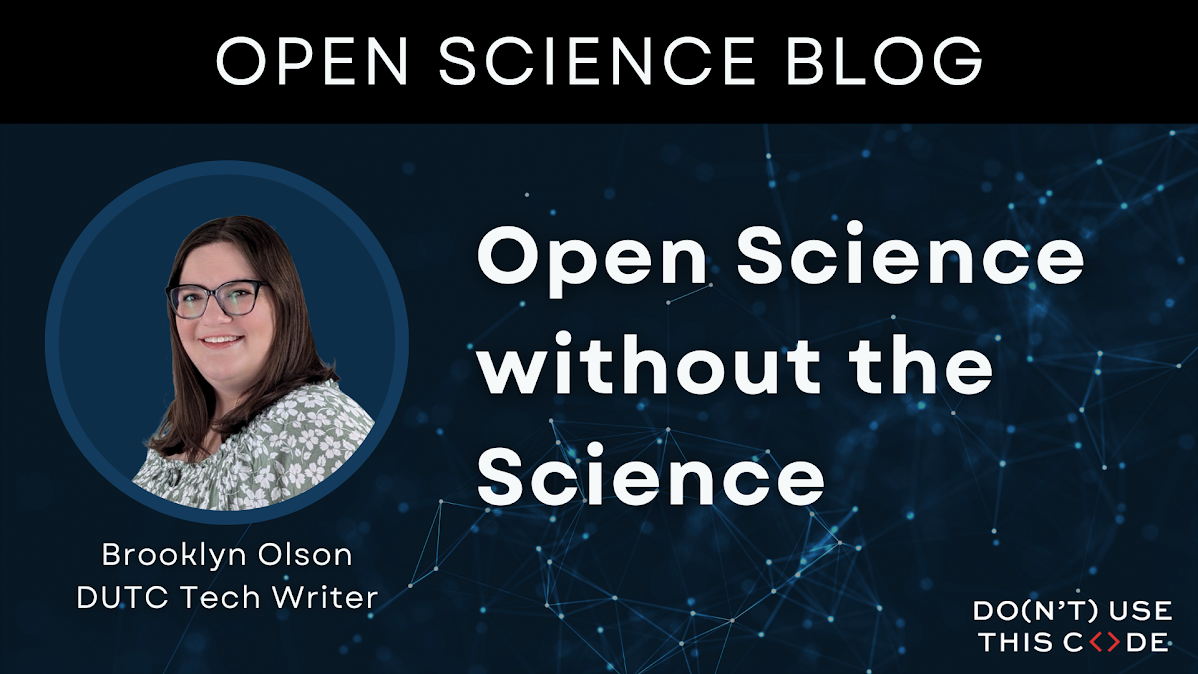Open Science without the Science
I am not a scientist. I am not a developer. Scratch engineer, analyst, and coding instructor off the list for good measure. My degree is in English with a Professional Writing emphasis. I took a couple of 101 coding classes to get a fancy IT certificate to look nice on a resume, but that's about it.
So, why have I taken nearly 20 Open Science trainings? I'll give you a hint: it's not just because I'm required to for my job. It's also not just because I enjoy them, either, although they're always the highlight of my day!
To put it simply, open science is open humanity, a way of collaboration that welcomes everyone to participate in discovery. Every time I attend the training, I take away something new about the idea that I can apply to everything from everyday conversations to community events to a technical work setting.
Ethics Is in Everything
One of the very first things we discuss in our Open Science Skills training is the principles of FAIR and CARE.
FAIR stands for findable, accessible, interoperable, and reusable.
Briefly, this means that research should be easily available, understandable, and replicable; what's the point of research if you're the only one to learn the answer? Time and funding are wasted, and no one else gets to benefit from the knowledge that was acquired.
CARE stands for collective benefit, authority to control, responsibility, and ethics. In short, this answers the question, "Who is the steward of this information, and what should they do with it?" While collective knowledge is important, it should not come at the expense of someone else. Information ultimately belongs to those from whom it came. Historically, minorities and indigenous groups fell victim to unethical scientific studies, a practice that the open science movement seeks to eradicate (e.g., the Tuskegee Syphilis Study, the 1990s Havasupai Tribe case, and Henrietta Lacks and HeLa Cells).

It's great that FAIR and CARE are being adopted in the scientific field, but what about everyone else? What can I learn from this? How does this apply to bookworms who edit technical documents for a living?
These ideas aren't just for scientists; they shape how we interact with information in our daily lives. If you've ever struggled to access a research paper hidden behind a paywall, you've experienced what happens when knowledge isn't FAIR. If you've ever seen cultural traditions misrepresented or exploited, you've witnessed the need for CARE.
For bookworms, technical writers, journalists, educators, or anyone who works with information, understanding open science means recognizing the value of transparency, collaboration, and ethical sharing. Maybe you're writing a blog post that references research, debugging open-source code, or just trying to fact-check an article. Knowing whether the information you're using is freely available, ethically sourced, and reproducible helps ensure that you're building on knowledge that is both correct and shared responsibly.
By learning these principles, you're not just supporting better science; you’re helping build a world where knowledge is open, equitable, and useful for everyone.
Literacy Is More Than Reading
"There was a study done about why brushing your teeth is actually bad for you."
"I saw a study that said drinking water is the reason I can't find a date."
"A study just came out about how breathing causes cancer."
From social media posts to casual conversations, the infamous "recent study" pops up everywhere. All too often, I hear people reference groundbreaking "facts" that have just been proven, usually without backing themselves up with a citation. While it's easy to accept the claims I like—the ones that confirm my existing worldview or even just make me laugh—I'm just as quick to deny the ones I don't. With no real evidence, I'm left with only my biases to determine the truth.
Unchecked hunches do not make for good science. When navigating a world packed full of knowledge, the art of information literacy is a necessary skill. According to the American Library Association, information literacy is "the set of integrated abilities encompassing the reflective discovery of information, the understanding of how information is produced and valued, and the use of information in creating new knowledge and participating ethically in communities of learning" (3). In short, it's the skill of finding, evaluating, and using information responsibly.
As non-scientists, we need to be shrewd about what information we consume, and even more cautious about what we believe. With the rise of open science, more information will be made publicly available. While this is an excellent opportunity to stay informed and educate ourselves about the world around us, we have to be more diligent about ensuring that the "facts" we learn are, in fact, facts. Referenced studies should be hunted down, and summaries should be scrutinized.
It's also crucial to understand who controls the information we consume. Open science isn’t just about access—it’s about accountability. Who conducted the study? Who funded it? What perspectives are missing? The CARE principles remind us that knowledge isn’t neutral; it carries responsibility.
By developing strong information literacy skills, we can engage with research thoughtfully, challenge misinformation, and make informed decisions. Whether we’re fact-checking a viral claim, evaluating an article's conclusions, or trying to make sense of a complex new idea, open science gives us the tools, but it’s up to us to use them wisely.
Citizen Science Is for Everyone
Even a non-scientist can be a scientist—no doctorate required. Welcome to the world of citizen science, where English majors can don metaphorical lab coats and contribute to scientific discovery. According to National Geographic, "Citizen science is the practice of public participation and collaboration in scientific research to increase scientific knowledge."
NASA and many other organizations are looking for everyday people to help them gather important data. No matter who you are or what your background is, you have a place in science. You can contribute to the work being done, and your unique perspective is valuable in broadening humanity's understanding of the world. (You might even have fun while you do it!)

Check out the pages below to find projects you might be interested in:
- NASA Science Projects
- National Geographic Citizen Science Projects
- citizenscience.gov
- Society for Science: Research at Home
Wrap-Up
Open science isn't just for researchers: it's for everyone! Ethics is in everything, and the way we share knowledge matters. Literacy is more than reading, and understanding how to evaluate information is a crucial skill in today’s world. And finally, citizen science is for everyone—you don’t need a PhD to contribute to real scientific discoveries.
That’s why we we're passionate about delivering Open Science Skills training. It’s completely free and designed for anyone who wants to learn how to navigate and contribute to open science. You’ll gain skills in data sharing, reproducibility, and ethical research—all while joining a growing community of open science advocates. Register for an upcoming cohort!
What do you think about open science? Have you ever participated in a citizen science project? Let’s talk about it on the DUTC Discord!
